Related Research Articles

Teguh Karya was an Indonesian film director. Starting his entertainment career in theatre, he made his directorial debut in 1971 with Wadjah Seorang Laki-Laki in which he also wrote the screenplay. He later directed numerous critically acclaimed films, including Cinta Pertama, Badai Pasti Berlalu, and November 1828. In 2001, Karya died from complications from a 1998 stroke.
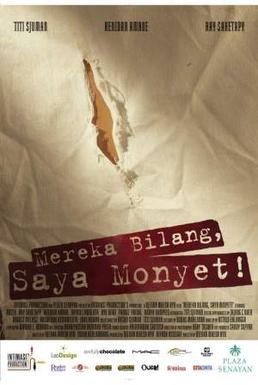
Mereka Bilang, Saya Monyet! is a 2008 Indonesian film directed by Djenar Maesa Ayu. Starring Titi Rajo Bintang, Henidar Amroe, and Ray Sahetapi, it tells the life story of Adjeng, who was sexually abused as a child by her mother's boyfriend. Filmed over 18 days after several years of development, the film adapted two of Ayu's short stories from her debut anthology of the same name. Owing to its low budget of Rp 620 million, its cast and crew were mostly amateurs and students, although several established actors appeared at reduced rates.

Slamet Rahardjo Djarot is an Indonesian actor, director, and screenwriter of Javanese-Bantenese descent. He is the elder brother of director, songwriter, and politician, Eros Djarot. Since his directorial debut in 1979 with Rembulan dan Matahari, he has directed and/or written twelve films; one of which, Langitku, Rumahku, was Indonesia's submission to the 63rd Academy Awards in 1991.

Roy Wicaksono Abdul Salam is an Indonesian actor.

Atiqah Hasiholan Alhady is an Indonesian-Arab actress.
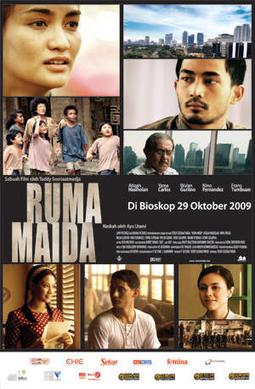
Ruma Maida is a 2009 Indonesian film written by Ayu Utami, directed by Teddy Soeriaatmadja and starring Atiqah Hasiholan, Yama Carlos, Nino Fernandez, and Frans Tumbuan. It details a woman's struggle to save a historic house from a developer; it also shows the life of the house's original owner.
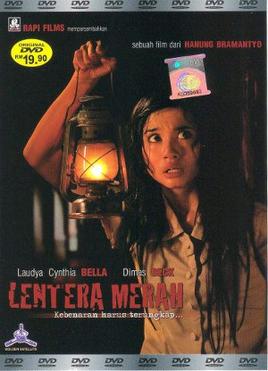
Lentera Merah is a 2006 Indonesian horror film directed by Hanung Bramantyo.
Nino Fernandez is an Indonesian actor of Minahasan, Sundanese, German and Portuguese descent. He's the older brother of singer Millane Fernandez.
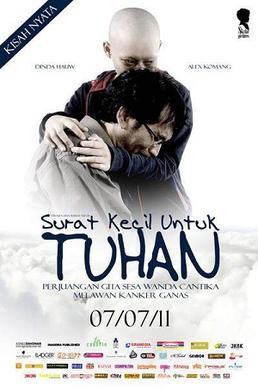
Surat Kecil untuk Tuhan is a 2011 Indonesian biographical drama film directed by Harris Nizam. The film stars Dinda Hauw and Alex Komang, it follows a young girl's struggle with cancer. It was the best-selling Indonesian film of 2011.

Pengkhianatan G30S/PKI is a 1984 Indonesian docudrama co-written and directed by Arifin C. Noer, produced by G. Dwipayana, and starring Amoroso Katamsi, Umar Kayam, and Syubah Asa. Produced over a period of two years with a budget of Rp. 800 million, the film was sponsored by Suharto's New Order government. It was based on an official history of the 30 September Movement coup in 1965 written by Nugroho Notosusanto and Ismail Saleh, which depicted the coup as being orchestrated by the Communist Party of Indonesia.

Kamila Andini is an Indonesian film director known for her critically acclaimed debut, The Mirror Never Lies.

Ponirah Terpidana is a 1984 Indonesian drama film directed by Slamet Rahardjo. Starring Nani Vidia, Rahardjo, and Ray Sahetapy, it follows a young woman named Ponirah who becomes a prostitute and is arrested for the murder of a rich businessman. The film, which combined traditional and contemporary elements, was a critical success in Indonesia. It won three Citra Awards at the 1984 Indonesian Film Festival, from a total of eleven nominations.
The Citra Award for Best Director is an award given at the annual Indonesian Film Festival (FFI) to Indonesian film directors in recognition for their achievement in the previous year. The Citra Awards, described by Screen International as "Indonesia's equivalent to the Oscars", are the country's most prestigious film awards and are intended to recognize achievements in films as well as to draw public interest to the film industry.
Herwin Novianto is an Indonesian film director who won the Citra Award for Best Director at the 2012 Indonesian Film Festival for his drama Tanah Surga... Katanya . He later directed Aisyah, biarkan kami bersaudara in 2016 which starred Laudya Cynthia Bella.
Nico Pelamonia was an Indonesian actor turned film director who won the Citra Award for Best Director in 1976 for his film Semalam di Malaysia. He has been involved in 33 feature film productions since his debut in Fred Young's Dibalik Awan in 1963.

H Lembu Amiluhur Priyawardhana Priyono, generally referred to as Ami Prijono was an Indonesian film director and actor. He was married to the feminist writer Julia Suryakusuma.

Miecke Marie De Rijder was an Indonesian actress, model, and politician who won three Citra Awards. She was crowned the best female antagonist in Indonesian film industry along with Suzzanna and Ruth Pelupessy. Wijaya began her career as a teenager and soared to popularity by partaking a role in Usmar Ismail's commercially successful Tiga Dara, her name became increasingly popular after starring in the soap opera Losmen in 1987.
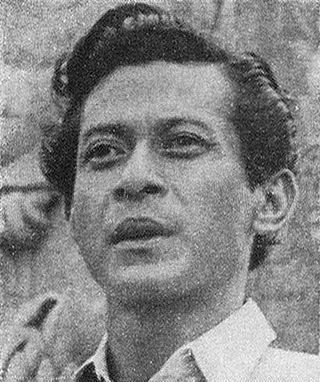
Mohamad Mochtar, usually credited as Moh Mochtar, was an Indonesian film actor active from 1939 until his death in 1981.

Lovely Man is a 2011 Indonesian film written and directed by Teddy Soeriaatmadja. The film had its world premiere at the 2011 Busan International Film Festival to positive reviews on the segment "A Window on Asian Cinema". Donny Damara plays the starring role as Syaiful/Ipuy, a transgender woman in Jakarta. Actress Raihaanun plays the female lead role as Cahaya, Syaiful's long-lost 19-year-old daughter who comes to the city to look for him and learns that her father is a transgender woman. This is their second film together after 2007 remake of drama Badai Pasti Berlalu.

Marjolein Tambayong, better known by her stage name Rima Melati or by her nickname Lientje, was an Indonesian actress, model, and singer. She appeared in close to one hundred feature films, including works by Wim Umboh, Sjumandjaja, and Teguh Karya. She received multiple awards, including a PWI Award for Best Actress for Noda Tak Berampun, a Citra Award for Best Leading Actress for Intan Berduri, and five nominations for the Citra Award for Best Supporting Actress.
References
- 1 2 3 Daylailatu 2006, Menyutradarai Sans Sutradara (1).
- 1 2 Hari 2005, Humor sweetens Banyu's.
- ↑ Daylailatu 2006, Menyutradarai Sans Sutradara (2).
- ↑ Rahman and Agusta 2005, Many local films.
- ↑ The Jakarta Post 2006, Hits and misses.
- ↑ Fadjar P. 2006, Sebuah Kotak Masa.
- ↑ Filmindonesia.or.id, Penghargaan Ruang.
- ↑ Suyono and Dewanto 2007, Badai tanpa Tafsir.
- ↑ Dwita 2007, Menikahi Sutradara.
- ↑ Suhendra and Soebijoto 2012, Raihaanun Tegang Jelang.
- ↑ Kurniasari 2009, 'Ruma Maida' portrays.
- ↑ Filmindonesia.or.id, Penghargaan Ruma Maida.
- ↑ Siregar 2011, At the Q! Film.
Bibliography
- Daylailatu, Hasuna (2006). "Menyutradarai Sans Sutradara (halaman 1)" [Directing the Director (page 1)]. Tabloid Nova (in Indonesian). Jakarta. Archived from the original on 4 March 2016. Retrieved 3 June 2012.
- Daylailatu, Hasuna (2006). "Menyutradarai Sans Sutradara (halaman 2)" [Directing the Director (page 2)]. Tabloid Nova (in Indonesian). Jakarta. Archived from the original on 13 February 2018. Retrieved 3 June 2012.
- Dwita (10 March 2007). "Menikahi Sutradara" [Marries a Director]. Suara Karya (in Indonesian). Archived from the original on 3 February 2013. Retrieved 3 June 2012.
- Fadjar P., Evieta (20 March 2006). "Sebuah Kotak Masa Lalu" [Box from the Past]. Tempo (in Indonesian). Archived from the original on 3 March 2016. Retrieved 3 June 2012.
- Hari, Kurniawan (6 March 2005). "Humor sweetens Banyu's blue tale". The Jakarta Post. Archived from the original on 4 March 2016. Retrieved 3 June 2012.
- Kurniasari, Triwik (1 November 2009). "'Ruma Maida' portrays the country's history". The Jakarta Post. Archived from the original on 15 June 2013. Retrieved 7 April 2012.
- "Penghargaan Ruang" [Awards for Ruang]. filmindonesia.or.id (in Indonesian). Jakarta: Konfidan Foundation. Archived from the original on 6 August 2015. Retrieved 3 June 2012.
- "Penghargaan Ruma Maida" [Awards for Ruma Maida]. filmindonesia.or.id (in Indonesian). Jakarta: Konfidan Foundation. Archived from the original on 29 October 2013. Retrieved 9 May 2012.
- Rahman, Lisabona; Agusta, Paul F. (29 December 2005). "Many local films, but has quality improved?". The Jakarta Post. Archived from the original on 4 March 2016. Retrieved 3 June 2012.
- Siregar, Lisa (3 October 2011). "At the Q! Film Festival, an Uneasy Balance". Jakarta Globe. Archived from the original on 15 October 2011. Retrieved 3 June 2012.
- Suhendra, Ichsan; Soebijoto, Hertanto (24 May 2012). "Raihaanun Tegang Jelang Melahirkan" [Raihaanun Stressed as She Prepares to Give Birth]. Kompas (in Indonesian). Archived from the original on 26 May 2012. Retrieved 3 June 2012.
- Suyono, Seno Joko; Dewanto, Andi (19 February 2007). "Badai tanpa Tafsir" [Storm Without Interpretation]. Tempo (in Indonesian). Archived from the original on 4 March 2016. Retrieved 3 June 2012.
- Yazid, Nauval (24 December 2006). "Hits and misses of Indonesian films 2006". The Jakarta Post. Archived from the original on 4 August 2009. Retrieved 29 May 2012.